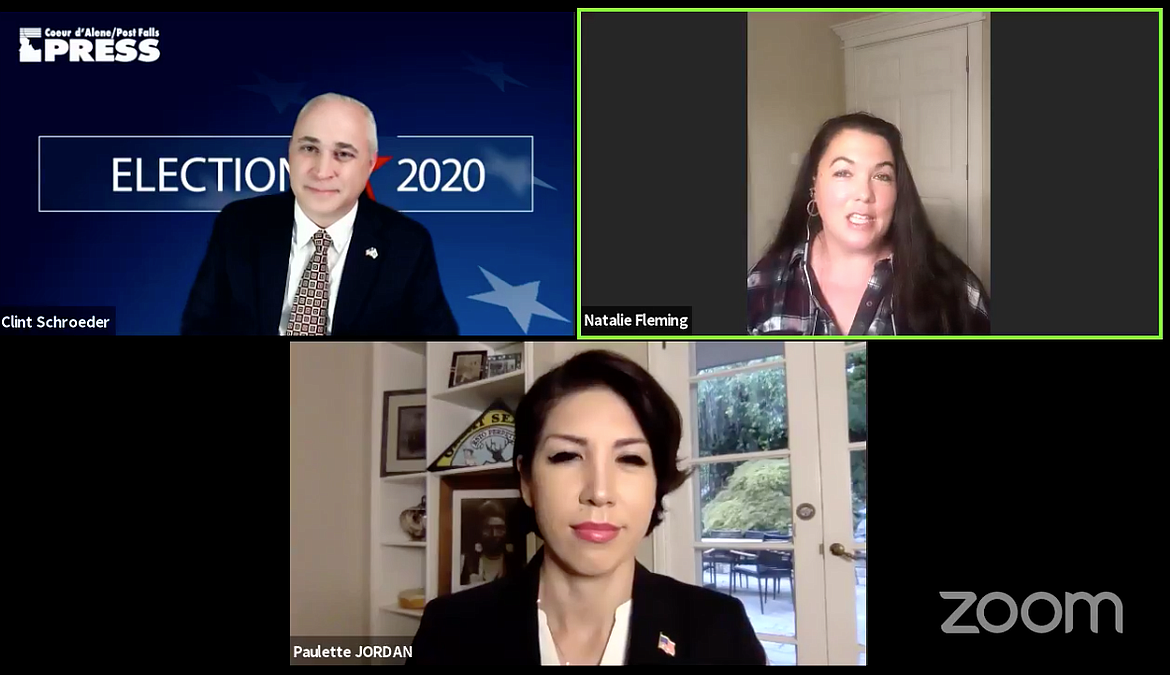National unity, political independence at heart of Congressional candidates
Click here to watch the Town Hall Forums
The Coeur d’Alene Press 2020 Town Hall Forum delved into the philosophical crisis of American discourse, as candidates for the U.S. Congress introduced themselves to the local electorate Thursday night.
“We don’t know each other anymore,” Rep. Russ Fulcher said when asked for evidence the United States was still united. “And I think that’s the answer to this question. We have got to figure out how to know one another. You don’t have to agree with people to know them.”
Fulcher, the incumbent looking for his second term in Congress, joined Democrat challenger Rudy Soto and Libertarian candidate Joe Evans in the first of a two-part virtual evening. All three were asked whether or not they saw the Constitution as a document that should be taken either literally or open to interpretation, and what they would do to bring bi-partisanship in the House of Representatives. Evans said the root of the country’s problem rests in a fear perpetuated by media.
“We don’t actually do news anymore,” Evans said. “We don’t do journalism. We don’t present the facts and allow people to come to their own conclusions. Ninety percent of the media that comes out now is op-eds.”
The candidates opened up to discuss policy, as well, including Soto’s push for infrastructure and resource development, such as salmon restoration, public land management and rural broadband.
“I’ve been on (to) every county, every community tour, throughout 19 counties here in north and west Idaho,” Soto said. “… What I’ve been seeing and hearing from people is the need for broadband internet, for reliable internet access. It’s just deeply unfair for so many kids and communities to be left out of an interconnected world.”
Fulcher said federal CARES Act money was already well on its way to helping rural communities and rural students. He closed his comments by saying the country is at a crossroads.
“I strongly believe in our representative Republic,” he said, “and I’m committed to doing everything I can to keep that.”
Evans, running on a liberty-minded platform, said that crossroads was well in the country’s rearview mirror, dating back to World War I and the proliferation of social programs.
“Part of the problem is,” he said, “we’ve created an addiction over the past hundred years to social programs, to socialized medicine, to a number of these other things. It’s time we step back and realize we need to give freedom of choice back to our constituents.”
Soto said Congress needs representatives with a closer bond to the challenges all Americans face.
“We’re in the midst of the darkest, lowest point — full of the most economic uncertainty — in our entire lifetimes,” Soto said. “Hopefully, we’ll never fall this low ever again, or go lower, which we potentially could. I’m driven by a desire to help unite us, to heal us, to help us turn the page, to transform, to turn a negative into a positive, and to create a more hopeful, optimistic future for all of us …”
House District 1 isn’t the only Congressional seat up for grabs. Sen. Jim Risch is up for re-election, as well. Two of the challengers for his Senate seat — Democrat Paulette Jordan and independent Natalie Fleming, joined moderator Clint Schroeder for the second half of the forum, which focused on political divisions, leadership and national unity.
“The primary function of this country — for all of us at this point in this day and age right now — is to ensure we can bring this country back together again,” Jordan said. “That starts with being positive and understanding we have the ability to put our partisan affiliation aside, as we should all do as leaders.”
Risch’s absence became particularly noteworthy as Jordan critiqued the senator’s ties to the Republican party and its standard bearer, President Donald Trump.
“I actually plan to go to Washington as an independent voice for Idaho,” Jordan said, “not a partisan politician, and certainly not a lapdog for a president, regardless of a president’s party. It doesn’t help anyone, and it sows a lot of division for our state, just in how Sen. Risch conducts himself in neglecting his constitutional oath to serve as a separate but equal branch of government.”
Fleming leveraged her political independence to critique the two-party system, a Democrat-versus-Republican stand-off she said could one day ruin the country by absolving individuals of responsibility.
“In order to bring people together, we have to let go of our parties,” she said. “Groupism has been incredibly destructive … The only nation that can destroy us is ourselves. We Americans are the only ones that have the power to destroy America, and our enemies know that, and they’re preying on that. Social media algorithms are working to divide us constantly.”
Both candidates made their respective cases — Jordan saying Republicans have failed Americans, Fleming saying the country’s institutions have failed Americans — for their candidacies to make the most changes. Fleming put forth her support for independent policies, including calls for a new privacy bill of rights.
“Right now, both Republicans and Democrats are voting to expand massive surveillance programs on American citizens,” Fleming said, “using the Department of Education, the Department of Labor, the Department of Everything. Their intent (is) to build what is called a longitudinal database tracking you from cradle to grave … It’s time to have a data privacy bill of rights.”
Jordan said she was seeking to overturn Risch’s tenure, saying that she will support her state first and foremost.
“I welcome the interest of all Idahoans,” Jordan said, “and when I’m elected, you have my word I will represent all Idahoans in the U.S. Senate, and not just the ones who vote for me. Because that’s what real, independent leadership looks like.”
Election Day is Nov. 3.

